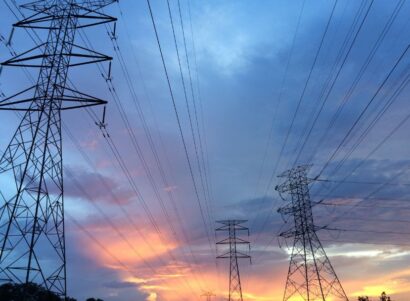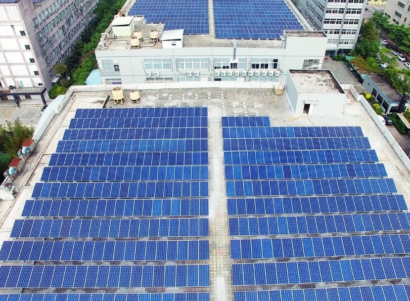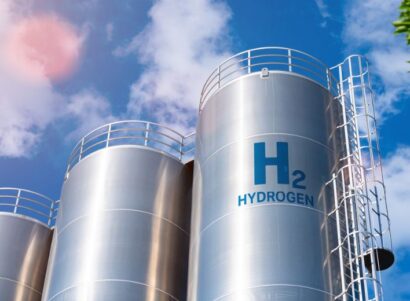PSE Energy Quarterly is the newsletter of Physicians, Scientists, and Engineers for Healthy Energy, a nonprofit research institute dedicated to supplying evidence-based scientific and technical information on the public health, environmental, and climate dimensions of energy production and use.
News Briefs
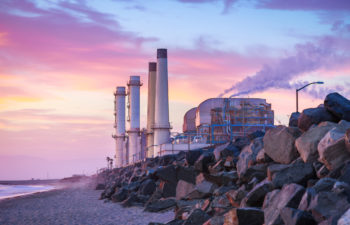
The U.S. relies on more than a thousand natural gas-, diesel- and oil-fired peaker power plants to meet episodic peaks in electric demand. These plants tend to be more expensive, inefficient and polluting than baseload natural gas plants and are also disproportionately located in disadvantaged communities. In a new screening analysis, PSE has identified peaker power plants across nine states that are prime candidates to be replaced by renewable energy and energy storage systems, based on both plant characteristics and where replacement would have the greatest environmental health and equity benefits. The study’s findings are now available for Massachusetts and New Jersey, including state-level summaries, interactive data visualization tools, and technical documentation. Stay tuned for New York, Texas, Florida, New Mexico, Arizona, California, and Nevada. Read about the project.
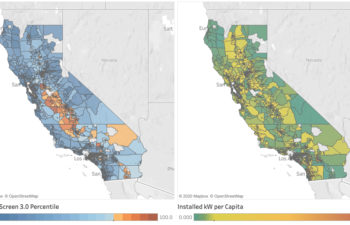
PSE has just launched an interactive mapping tool to visualize which communities in California have rooftop solar systems. Based on a recent PSE study, this new interactive map demonstrates an equity gap in solar adoption that correlates with a combination of socioeconomic, health, and environmental factors. Policymakers can use the tool to track the efficacy of solar programs and to inform the design of new policy and market incentives to more effectively target disadvantaged communities. Users can filter results by variables such as customer segment, utility territory, and disadvantaged communities. Go to the interactive map.

PSE has been expanding the deployment of air quality monitors at residences throughout Richmond-San Pablo (CA). These air sensors measure real-time concentrations of health-relevant criteria air pollutants such as particulate matter, nitrogen oxides and ozone. Follow our data collection efforts that aim to better understand the distribution of poor air quality and to inform efforts to reduce air pollution exposure on our Recent News and Updates page. Read about the Richmond Air Monitoring Network.

PSE Executive Director Seth Shonkoff was invited by SciLine, an organization formed under the prestigious American Association for the Advancement of Science (AAAS), to be a part of a panel of experts convened to communicate to dozens of journalists from around the country. The panel focused on the state of scientific research on the public health dimensions of oil & gas development. This event took place at State College, PA in collaboration with Penn State University — with the goal to better equip journalists with scientific tools to strengthen their reporting on these issues and increase their ability to distinguish between scientific evidence and opinion. Read about the event.
PSE in the Media
- Equitable Zoning for Oil Production California’s Governor Newsom plans to strengthen statewide regulations for public health and safety near oil and gas production facilities, possibly establishing buffer zones between these facilities and sensitive sites such as homes and schools. A recent news story on buffer zones featured a PSE report that concluded the development of oil and gas close poses greater hazards and risks to public health for nearby communities than it does to those that live further away. Read the news story.
- Look Before We Leap: Regulating Produced Water Reuse PSE Executive Director Dr. Seth Shonkoff and other scientists call for more research to be done before federal or state agencies ease regulations and expand wastewater from oil and gas development to be discharged to rivers in the Southwest and reused agricultural irrigation and drinking water. Read the news story.
- Revising New Solar Regulations California passed a groundbreaking law requiring the installation of solar panels on newly-built homes. However, regulators are now allowing developers to power these home projects using newly-installed offsite solar farms instead. See what PSE Senior Scientist Dr. Boris Lukanov and other scientists have to say about this decision. Read the news story.






